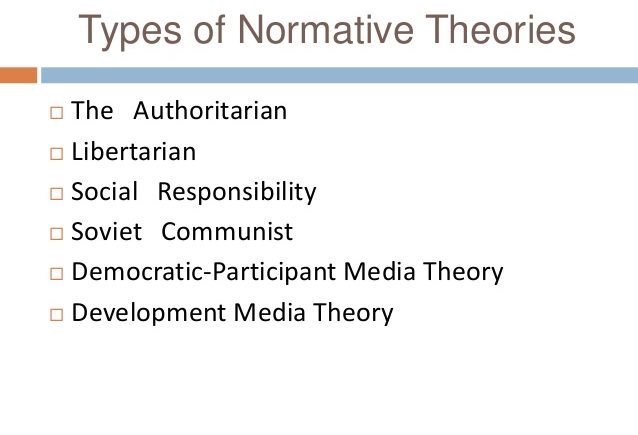Chapter#5: NORMATIVE THEORIES OF MASS COMMUNICATION During the era of yellow journalism, most media professionals cared very little for the niceties of accuracy, objectivity, and public sensitivities. But in the first decades of the twentieth century, a crusade began among some media industry people and various social elites to clean up the media and make them more respectable and credible. The watchword of this crusade was professionalism, and its goal was elimination of shoddy and irresponsible content. Some sort of theory was needed to guide this task of media reform. The goal of this theory would be to answer questions such as these: Should media do something more than merely distribute whatever content will earn them the greatest profits in the shortest time? Are there some essential public services that media should provide even if no immediate profits can be earned? Should media become involved in identifying and solving social […]
THE RISE OF MEDIA INDUSTRIES AND MASS SOCIETY THEORY
Chapter# 3: THE RISE OF MEDIA INDUSTRIES AND MASS SOCIETY THEORY (Review) First Amendment Guarantees freedom of speech, press, assembly, and religion Culture war Struggle to define the cultural foundation of the broader social order in which we live THE RISE OF YELLOW JOURNALISM At the beginning of the twentieth century, every industry had its barons, and the most notorious—if not the greatest—of the press lords was Hearst. Hearst specialized in buying up failing newspapers and transforming them into profitable enterprises. He demonstrated that the news business could be as profitable as railroads, steel, or oil. One secret to his success was devising better strategies for luring low income readers. His newspapers combined a low-selling price with innovative new forms of content that included lots of pictures, serialized stories, and comic strips. Some experts even say that yellow journalism got its name from one of the first comic strips: “The Yellow […]
Four Eras Of Mass Media Theory (Review)
Mass Communication Theory Foundations, Ferment, and Future Review of Chaper 2: FOUR ERAS OF MEDIA THEORY We have identified four distinct eras in the development of mass communication theories, beginning with the origin of media theory in the nineteenth century and ending with the emergence of an array of contemporary perspectives. THE ERA OF MASS SOCIETY AND MASS CULTURE The era of mass society theory is characterized by overinflated fears of media’s influence on “average” people and overly optimistic views of their ability to bring about social good. Powerful social and cultural elites, who saw the traditional social order that was serving them so well undermined by popular media content, were the primary advocates of the former view. Urban elites—the new capitalists whose power was increasingly based on industrialization and urbanization—viewed technology, including the mass media, as facilitating control over the physical environment, expanding human productivity, and generating new forms […]
Theory & Different Basic Mass Communication Theories
Mass Communication Theory Foundations, Ferment, and Future Review of Chaper 1: DEFINING AND REDEFINING MASS COMMUNICATION When an organization (Source) employs a technology as a medium to communicate with a large audience, mass communication is said to have occurred. SCIENCE AND HUMAN BEHAVIOR Implementation of the scientific method is difficult for those studying the social world for four reasons: Most of the significant and interesting forms of human behavior are quite difficult to measure. How do we measure something like civic duty? Should we count the incidence of voting? Maybe a person’s decision not to vote is her personal expression of that duty. Try something a little easier, like measuring aggression in a television violence study. Can aggression be measured by counting how many times a child hits a rubber doll? Is gossiping about a neighbor an aggressive act? How do we measure an attitude (a predisposition to do something […]
EMERGENCE OF MEANING-MAKING PERSPECTIVES ON MEDIA
EMERGENCE OF MEANING-MAKING PERSPECTIVES ON MEDIA Limited-effects notions have undergone important transformations, partially because of pressures from cultural studies, but also because of the emergence of new communication technologies that have forced a rethinking of traditional assumptions about how people use (and are used by) media. We are in the early stages, then, of what may well become the fourth era of mass communication theory. These new perspectives are transforming how we think about media effects. For example, framing theory and the media literacy movement offer compelling and cogent arguments concerning the way mass communication influences individuals and plays an important role in the social world. We are again living in an era when we are challenged by the rise of powerful new media that clearly are altering how most of us live our lives and relate to others. And we have developed new research strategies and methods that provide […]
COMPETING CULTURAL PERSPECTIVES CHALLENGE LIMITED-EFFECTS THEORY
FERMENT IN THE FIELD: COMPETING CULTURAL PERSPECTIVES CHALLENGE LIMITED-EFFECTS THEORY Despite these pockets of domestic resistance, most mass communication researchers in the United States still found limited-effects notions and the empirical research findings on which they were based persuasive. But challenge also came from researchers in other parts of the world who were less convinced, as you’ll see in Chapter 9. Mass society notions continued to flourish in Europe, where both leftwing and right-wing concerns about the power of media were deeply rooted in World War II experiences with propaganda. Europeans were also skeptical about the power of postpositivist, quantitative social research methods to verify and develop social theory (they saw this approach to research as reductionist—reducing complex communication processes and social phenomena to little more than narrow propositions generated from small-scale investigations). This reductionism was widely viewed as a distinctly American fetish. Some European academics were resentful of the […]
